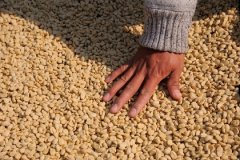There is a big shortage of coffee beans and the price may fluctuate greatly in the future.

Photo / Associated Press
Coffee prices are likely to fluctuate sharply in the coming months due to four consecutive years of supply shortages and a sharp drop in stocks, which will trigger market volatility, the Financial Times reported.
Production of Arabica coffee beans produced in Brazil is expected to fall by 13 per cent between 2017 and 2018, while coffee stocks are likely to fall to an eight-year low, according to Rabobank.
Rabobank also forecasts that the coffee stock-to-use ratio (stock-to-use ratio) will be about 30 per cent between 2017 and 2018, the lowest since 2009-2010. Mela, an analyst at Rabobank, warned that low inventories meant that "as soon as the weather goes wrong, the impact on coffee prices will be more severe."
Brazil is the world's largest producer of coffee beans, but drought in recent years has hit Arabica coffee bean production hard in 2014, while the main producing areas of Robusta coffee beans have experienced severe droughts in the past few years.
Brazil's Arabica coffee beans had a bumper harvest last year, producing about 42 million bags of 60 kilograms each, resulting in a big drop in production this year.
Coffee production in Brazil varies greatly from year to year. The previous year had a bumper harvest, and the crops needed time to recover, which led to crop failures next year.
In addition, coffee farmers' extensive pruning of coffee trees may further reduce coffee bean production. Rabobank predicts that the output of Arabica coffee beans may fall to 36.7 million bags.
Demand for coffee beans has soared over the past few years, and non-coffee-producing countries have begun to build up their stocks and hoard them. However, as coffee production decreases, buyers turn their attention to these stocks. "We believe the market will need this inventory in the next 15 months," Ms Mera said. "
Some analysts question that the sharp decline in the supply of Arabica coffee beans has led to four consecutive years of global inventory shortages, but is not fully reflected in prices.
Arabica coffee beans now cost about $1.422 a pound, 10 per cent higher than at the beginning of 2016, but far below where they were at the end of last year, when supply shortages sent the price of Arabica beans soaring to nearly $1.80 a pound.
James Hearn, head of commodities brokerage Marex Spectron, points out that the shortage of Arabica coffee beans this year is not fully reflected in prices. "there is bound to be a problem after that," he said. "
Important Notice :
前街咖啡 FrontStreet Coffee has moved to new addredd:
FrontStreet Coffee Address: 315,Donghua East Road,GuangZhou
Tel:020 38364473
- Prev

Coffee shop where Wi-Fi stops.
╱ Associated Press around the world, due to the booming gig economy, many people choose to work at home or in a coffee shop, making the coffee shop the best office for action. Now, some cafes want to reverse this trend and make it back to its essence as a place for people to get together, talk and exchange emotions. ■ Suchinformal pub
- Next

Mistakenly believed that the expert had been miserable for five years. He said it was not shameful to rely on his father.
This is the age of consulting experts on everything. It took this young man five years to learn two things from experts: it is better to be an expert than to believe in an expert. Moreover, it is not shameful to rely on your father, who is more reliable than an expert. Fang Zhenglun, a 37-year-old youth of Zou nationality, majored in electronics. Just discharged from the army more than 10 years ago, he returned to his hometown to manage his father's new coffee garden, and there happened to be an agricultural official with a professional background.
Related
- Workers collapse! Lucky suspects that it will introduce freshly cut fruits?!
- 1-point subsidy recipients wear thousand-yuan watches?! Local response: For low-income households
- Can lightly roasted coffee beans be used to extract espresso? How finely should you grind high-quality coffee beans to make Italian latte?
- What is the difference between the world's top rose summer coffee and Yejia Shefi? What are the flavor characteristics of Yega Shefi coffee and Panama rose summer?
- The ceremony is full! Starbucks starts to cut the ribbon at a complimentary coffee station?!
- A whole Michelin meal?! Lucky launches the new "Small Butter Apple Crispy Latte"
- Three tips for adjusting espresso on rainy days! Quickly find the right water temperature, powder, and grinding ratio for espresso!
- How much hot water does it take to brew hanging ear coffee? How does it taste best? Can hot water from the water dispenser be used to make ear drip coffee?
- What grade does Jamaica Blue Mountain No. 1 coffee belong to and how to drink it better? What is the highest grade of Blue Mountain coffee for coffee aristocrats?
- What are the flavor characteristics of the world-famous coffee Blue Mountain No. 1 Golden Mantelin? What are the characteristics of deep-roasted bitter coffee?

